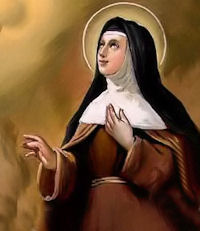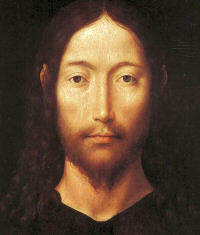Lent: March 6th
Saturday of the First Week of Lent
Other Commemorations: St. Colette, Virgin and Religious (RM)
» Enjoy our Liturgical Seasons series of e-books!
"But I say this to you: love your enemies and pray for those who persecute you; in this way you will be sons of your Father in heaven, for he causes his sun to rise on bad men as well as good, and his rain to fall on honest and dishonest men alike." This is the second Saturday in Lent, let's turn to Mary, the refuge of sinners and put under her maternal protection the humble penances we are now going through.
Before the reform of the Roman Calendar today was the feast of Sts. Perpetua and Felicitas. Their feast has been transferred to March 7.
The Station is in the basilica of St. Peter in the Vatican, where the people would assemble towards evening, that they might be present at the ordination of the priests and sacred ministers. This day was called Twelve-Lesson-Saturday, because, formerly, twelve passages from the holy Scriptures were read, as upon Holy Saturday. Built by Constantine in 323 the basilica was erected over the place where St. Peter was buried.
Meditation - The Faults of Our Neighbor
In disagreements between you and your neighbor, you must always remember that to be in the right is the consideration that influences a Christian the least. The philosopher may indulge such a satisfaction. But to be in the right and to act as if one were not, to allow one's opponent to triumph on the side of injustice,-this means to overcome evil by good, and to secure peace for one's soul. No more convincing argument for your own vindication is required than the silent exterior acknowledgment that you are in the wrong. He who edifies does more for the truth than he who is zealous for the combat. Instead of trying to refute those that are in the wrong, it is better to pray for them. A stream flows much more rapidly when nothing is done to hold it back. Pray for those who are prejudiced against you, never become embittered against them, pity them, await their return to better feelings, and help to free them from their prejudices. One would not be human if he does not feel how easy it is to stray, and how much it costs to acknowledge this. The spirit of meekness, of indulgence, of patience and humility in examining the behavior of others toward us, secures us that peace of mind which is not compatible with the jealous, suspicious sensibilities of self-love. — Fénelon
Things to Do:
- Your children may want to spend their Saturday afternoon learning about different local charitable organizations or needy families to whom the alms from the family's Lenten Jar will be given.
- Read this thought-provoking article by George Rutler,Why We Need Lent, to understand why such a season of mortification is necessary for us to become saints.
St. Colette
 Born in 1380, Nicolette was named in honor of St. Nicholas of Myra. Her loving parents nicknamed her Colette from the time she was a baby. Colette's father was a carpenter at an abbey in Picardy. Quiet and hard-working, Colette was a big help to her mother with the housework. Her parents noticed the child's liking for prayer and her sensitive, loving nature.
Born in 1380, Nicolette was named in honor of St. Nicholas of Myra. Her loving parents nicknamed her Colette from the time she was a baby. Colette's father was a carpenter at an abbey in Picardy. Quiet and hard-working, Colette was a big help to her mother with the housework. Her parents noticed the child's liking for prayer and her sensitive, loving nature.
When Colette was seventeen, both her parents died. The young woman was placed under the care of the abbot at the monastery where her father had worked. She asked for and received a hut built next to the abbey church. Colette lived there. She spent her time praying and sacrificing for Jesus' Church. More and more people found out about this holy young woman. They went to see her and asked her advice about important problems. They knew that she was wise because she lived close to God. She received everybody with gentle kindness. After each visit, she would pray that her visitors would find peace of soul. Colette was a member of the Third Order of St. Francis. She knew that the religious order of women who followed St. Francis' lifestyle are the Poor Clares. They are named after St. Clare, their foundress, who was a follower of St. Francis. During Colette's time, the Poor Clares needed to go back to the original purpose of their order. St. Francis of Assisi appeared to Colette and asked her to reform the Poor Clares. She must have been surprised and afraid of such a difficult task. But she trusted in God's grace. Colette traveled to the Poor Clare convents. She helped the nuns become more poor and prayerful.
The Poor Clares were inspired by St. Colette's life. She had a great devotion to Jesus in the Eucharist. She also spent time frequently meditating on the passion and death of Jesus. She loved Jesus and her religious vocation very much.
Colette knew exactly when and where she was going to die. She died in one of her convents in Ghent, Flanders, in 1447. She was sixty-seven. Colette was proclaimed a saint by Pope Pius VI in 1807.
—Excerpted from Holy Spirit Interactive
Symbols and Representation: birds; lamb; woman being carried to heaven by an angel; woman delivering a soul from purgatory; Poor Clare nun holding a crucifix and a hook; Poor Clare nun visited by Saint Anne, Saint Francis of Assisi, and/or Saint Clare of Assisi in a vision; Poor Clare nun walking on a stream
Patronage: against eye disorders; against fever; against headaches; against infertility; against the death of parents; craftsmen; Poor Clares; servants; Corbie, France; Ghent, Belgium
Highlights and Things to Do:
- Read more about St. Colette:
- The Colettines are a reformed branch of the Poor Clares. See the Ty Mam Duw Poor Clare Colettine Community for an example of one of the communities.
- St. Colette's relics are at Monastère Sainte-Claire in Poligny, France.






